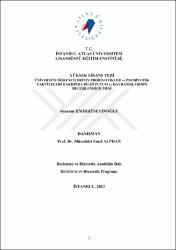| dc.contributor.author | Emirhüseyinoğlu, Ayşenur | |
| dc.date.accessioned | 2023-10-06T08:29:03Z | |
| dc.date.available | 2023-10-06T08:29:03Z | |
| dc.date.issued | 2023 | en_US |
| dc.date.submitted | 2023-07-06 | |
| dc.identifier.citation | Emirhüseyinoğlu, A. (2023). Üniversite öğrencilerinin probiyotikler ve probiyotiktakviyeleri hakkında bilgi tutum ve davranışlarının değerlendirilmesi. (Yüksek lisans tezi, İstanbul Atlas Üniversitesi, İstanbul). Erişim adresi | en_US |
| dc.identifier.uri | https://hdl.handle.net/20.500.12900/174 | |
| dc.description.abstract | İnsan vücudunun daha iyi anlaşılmasıyla vücuttaki mikroorganizmaların farklı işlevleri olduğu görülmüştür. Yapılan çalışmalar probiyotiklerin birçok hastalık üzerindeki olumlu etkisini kanıtlamıştır. Probiyotik ve prebiyotiklerin sağlık faydaları ile birlikte takviye ürün pazarında hem dünyada hem ülkemizde büyük bir genişleme meydana gelmiştir. Bu çalışma geleceğin sağlık profesyonelleri olacak olan Sağlık Bilimleri Fakültesi öğrencilerinin probiyotik takviyesi kullanımının yaygınlığını saptamayı, probiyotikler ile ilgili doğru bilinen yanlışları tespit etmeyi ve bu popülasyonun bilgi düzeyini ölçmek amaçlamıştır. Çalışmaya İstanbul Atlas Üniversitesi Sağlık Bilimleri Fakültesi'nde okuyan 166 öğrenci dahil edilmiştir. Katılımcılara gönüllülük esasına dayalı olarak anket uygulanmıştır. Anketlerde katılımcıların sosyodemografik özellikleri, probiyotik bilgi, tutum, davranışları ve besin tüketim özelliklerini sorgulanmıştır. Katılımcıların %91.6'sı kadın %8.4 erkek olup öğrencilerin yaş ortalaması 20.291.49'dur. Katılımcıların %16'sı Beslenme ve Diyetetik, %17'si Dil Konuşma Terapisi, %19'u Ebelik, %10'u Ergoterapi, %5'i Fizyoterapi ve Rehabilitasyon ve %33'ü Hemşirelik bölümü öğrencisidir. Katılımcıların %29'u daha önce probiyotik takviyesi kullanmış iken %71'i daha önce probiyotik takviyesi kullanmamıştır. Daha önce probiyotik takviyesi kullanan katılımcıların %58.3'ü probiyotikleri "sindirim sistemi sorunları" için kullandığını belirtirken %39.6'sı "bağışıklık sistemi sorunları" için %2.1'i ise "dolaşım sistemi sorunları" için kullandığını belirtmiştir. Daha önce probiyotik takviyesi kullanmayan katılımcıların %49.2'si probiyotik takviye kullanmama sebebinin "ihtiyaç duymamak" olduğunu belirtmiştir. Katılımcıların %97'si "yoğurt, kefir gibi fermente süt ürünlerinin probiyotik kaynakları" olduğunu düşünürken katılımcıların %77.1'i "yoğurt, kefir gibi fermente süt ürünlerini probiyotik kaynaklar olduğu için tükettiğini" belirtmiştir. Katılımcıların %53'ü günde en az bir kere bir porsiyon yoğurt tüketirken %1'i yoğurt tüketmediğini bildirmiştir. Katılımcıların %3'ü günde en az bir kere bir porsiyon kefir tükettiğini belirtirken %61'i kefir tüketmediğini bildirmiştir. Katılımcıların çoğu probiyotiklerin sağlığa faydalı olduğunu düşünmektedir ancak probiyotiklerin sağladığı faydalar konusunda bilgi eksikliği mevcuttur. Probiyotikler ile ilgili çeşitli çalışmalardan elde edilen bilimsel kanıtların sağlık bilimleri fakültelerinin eğitim müfredatlarına dahil edilmesi probiyotiklerin daha iyi anlaşılmasına, gelecekteki tedavi protokollerinden daha fazla kullanılmasına yardımcı olabilir. | en_US |
| dc.description.abstract | With a better understanding of the human body, it has emerged that microorganisms in the body have different functions. Studies have proven the positive effect of probiotics on diseases such as gastrointestinal diseases, allergic diseases, obesity, insulin resistance. Along with the health benefits of probiotics and prebiotics, there has been a great expansion in the supplement product market both in the world and in our country. This study aims to determine the prevalence of probiotic supplement use among students studying at the Faculty of Health Sciences, who will be the health professionals of the future, to identify the misconceptions about probiotics and to measure the knowledge level of the population. 166 students studying at Istanbul Atlas University Faculty of Health Sciences were included in the study. A questionnaire was applied to the participants on a voluntary basis. In the first part of the questionnaire, there are questions to determine the sociodemographic characteristics of the participants, in the second part of the probiotic knowledge, attitudes and behaviors, and in the third part of the food consumption characteristics. 91.6% of the participants are female and 8.4% are male, and the average age of the students is 20.291.49. 16% of the participants are Nutrition and Dietetics, 17% Language and Speech Therapy, 19% Midwifery, 10% Occupational Therapy, 5% Physiotherapy and Rehabilitation, and 33% Nursing. While 29% of the participants had used a probiotic supplement before, 71% had not used a probiotic supplement before. While 58.3% of the participants who used probiotic supplements before stated that they used probiotics for "digestive system problems", 39.6% stated that they used them for "immune system 20 problems" and 2.1% for "circulatory system problems". While 49.2% of the participants who did not use probiotic supplements before stated that the reason for not using probiotic supplements was "not needing". While 97% of the participants thought that "fermented milk products such as yoghurt and kefir are probiotic sources", 77.1% of the participants stated that they "consume fermented milk products such as yoghurt and kefir because they are probiotic sources". While 53% of the participants consumed a portion of yogurt at least once a day, 1% reported that they did not consume yogurt. While 3% of the participants stated that they consumed a portion of kefir at least once a day, 61% reported that they did not consume kefir. Most participants agree that probiotics provide health benefits, but they lack knowledge about the benefits of probiotics. The inclusion of scientific evidence from various studies on probiotics in the education curricula of health science faculties may help to better understand probiotics and use them more in future treatment protocols. | en_US |
| dc.language.iso | tur | en_US |
| dc.publisher | İstanbul Atlas Üniversitesi, Lisansüstü Eğitim Enstitüsü | en_US |
| dc.rights | info:eu-repo/semantics/openAccess | en_US |
| dc.subject | Beslenme ve Diyetetik | en_US |
| dc.subject | Nutrition and Dietetics | en_US |
| dc.title | Üniversite öğrencilerinin probiyotikler ve probiyotiktakviyeleri hakkında bilgi tutum ve davranışlarının değerlendirilmesi = Correlation of information attitudes and behaviors of universitystudents about probiotics and probiotic supplements | en_US |
| dc.type | masterThesis | en_US |
| dc.department | İstanbul Atlas Üniversitesi, Lisansüstü Eğitim Enstitüsü, Beslenme ve Diyetetik Ana Bilim Dalı | en_US |
| dc.relation.publicationcategory | Tez | en_US |

















